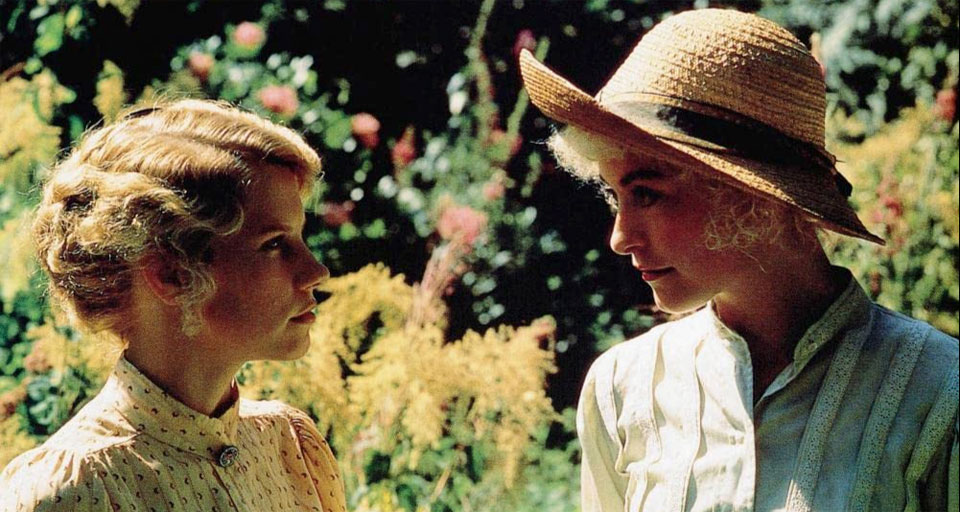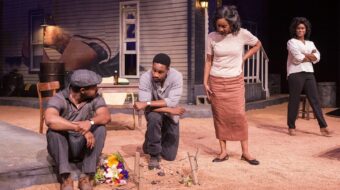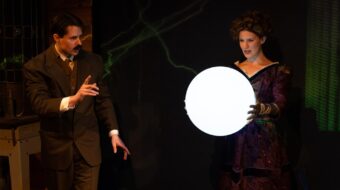
Just in case you haven’t had enough of those “Masterpiece Theater” type of prestigious, polished, Brit productions, the British Film Institute has launched a subscription video on demand collection of more than 200 of the top U.K. movies for buffs across the pond in the colonies. BFI Player Classics offers the cream of the crop across genres, ranging from thrillers to comedies to horror to sci-fi to documentaries and beyond.
The movies are categorized as “Collections,” including “Alfred Hitchcock,” which focuses on the England-born Master of Suspense’s oeuvre before he relocated to Hollywood, such as Hitch’s 1930 whodunit Murder! “Ealing Comedies” features flicks from that eponymous studio known for its humor-laced output, some starring Alec Guinness before he used the “force” in Star Wars, in 1949’s Kind Hearts & Coronets and 1951’s The Lavender Hill Mob. The “British Classics” Collection includes Carol Reed’s 1949 postwar film noir piece de resistance The Third Man, with a cynical Orson Welles portraying the titular underworld mastermind. Interestingly, none of the 200-plus offerings include screen adaptations of William Shakespeare’s plays.
According to press notes: “The streaming platform will also host a number of titles not currently available across any other USA SVOD service, these including:
The Lion in Winter (Anthony Harvey, 1968),
I’m All Right Jack (John Boulting, 1959),
Dunkirk (Leslie Norman, 1958),
Went the Day Well? (Alberto Cavalcanti, 1942).”
The Lion in Winter is famed for its tour de force acting, as Eleanor of Aquitaine (Katherine Hepburn, who won an Oscar for her riveting performance) faces off against King Henry II (Peter O’Toole, who was Oscar-nommed) in this unforgettable 1183-set drama of palace intrigue and familial strife, which scored a total of three Academy Awards and was nominated for four more Oscars, including in the Best Picture category. I’m All Right Jack is a satirical look at the class struggle, UK style, starring the inimitable Peter Sellers as a trade unionist and a pre-Jurassic Park Richard Attenborough as a factory boss. Dunkirk, which dramatizes that pivotal 1939 evacuation of troops across the Channel, is in the “Britons in Battle” Collection. As is Went the Day Well? which—made during WWII—imagines a Nazi incursion on British soil and the locals’ stiff upper lip resistance to it.
The selections offered by BFI Player Classics are curated and provided by the renowned British Film Institute, a venerable organization established in 1933 to promote and preserve UK cinema. Funded by public and private sources, BFI boasts one of the world’s largest motion picture archives.
As a film historian and critic, I’ve had the joy of seeing many of these vintage films over the years, such as John Schlesinger’s 1963 Billy Liar starring Tom Courtenay and Julie Christie, a Kitchen Sink comedy which freely mixes fantasy and reality. So, I decided to start my BFI Player Classics journey by streaming a film I’d never seen before, Ken Russell’s 1989 The Rainbow. I had, however, seen Russell’s 1969 Women in Love, which is one of the best screen adaptations of a novel in the history of English-speaking cinema and received three Academy Award noms—including for Best Director—while Glenda Jackson won the coveted golden statuette for Best Actress. Larry Kramer, later known for his anti-AIDs activism and 2014’s The Normal Heart, was nommed for Best Writing, Screenplay Based on Material from Another Medium.
Kramer’s script faithfully adapted D. H. Lawrence’s 1920 novel Women in Love, which the British author actually wrote after 1915’s The Rainbow as a continuation or sequel to the earlier Women in Love, with some of the same characters. Russell, however, filmed adaptations of the novels in the reverse order of when Lawrence wrote them so that his version of The Rainbow—co-scripted by Russell and his then wife, Vivian Russell—is a sort of prequel to his screen iteration of Women in Love shot 20 years earlier. In an inspired bit of canny casting, in The Rainbow Glenda Jackson plays Anna Brangwen, who is actually the mother of Gudrun Brangwen—the character she’d portrayed two decades earlier in Women in Love. Got it?
Anna is also the mother of Ursula Brangwen, who is the focus of the portions of Lawrence’s The Rainbow as rendered by Russell. While still a schoolgirl, Ursula is depicted by English actress Sammi Davis, who like her similarly named American counterpart, has “gotta be me” (Jennie Linden played Ursula in Women in Love). Ursula rebels against the stifling conventions of her Victorian era middle-class lifestyle in The Rainbow, insisting that she pursues independence and has a career—and love life—of her own.
Lawrence’s most famous novel is 1928’s Lady Chatterley’s Lover (Russell directed and co-scripted a 1993 mini-series version of it), and the author, of course, is largely known for the sexuality of his literature—call it “clit lit.” Russell’s The Rainbow is full of erotically charged scenes and themes, including some that would be looked askance at in our age of heightened awareness of sexual impropriety.
In particular, Ursula is seduced by the older Winifred Inger (Amanda Donohoe, who’d have a recurring role in the 1990s U.S. TV series L.A. Law), and the two females share some full-frontal scenes together. In addition to the same-sex nature of the relationship, Winifred is an instructor at the younger Ursula’s school, and of course, student-teacher liaisons are big taboos today. Both women appear to be bisexual as they also have sex with males—indeed, Winifred weds Ursula’s Uncle Henry, played by David Hemmings of Blow-Up fame. For some reason, there is no full-frontal male nudity in The Rainbow’s somewhat graphic heterosexual scenes, unlike the famed nude wrestling match between Alan Bates and Oliver Reed in Women in Love.
Lawrence was the son of a miner, and his mother worked in a factory at times, and his working-class origins show in The Rainbow. Henry is a mine owner, which prompts Ursula to say and do some rather scathing things to rebel against her capitalist uncle. The film, which is set during the period of the Boer War in South Africa (1899-1902), also includes biting commentary on militarism, imperialism, sexism, women’s rights, environmentalism, and more, as Ursula fights to assert her autonomy in the male-dominated rigid class system. Lawrence arguably prefigures Wilhelm Reich in his psycho-sexual take on the class struggle, fusing elements of Freudian psychology with a Marxian critique of the ruling class.
Ken Russell’s movies were known for his outré sexuality and over the top cinematic sensibility, epitomized by 1975’s Tommy and Lisztomania (both starring The Who’s Roger Daltrey). With its torrid sexuality and filmic flourishes, The Rainbow takes its rightful place in the Russell canon. It is a worthy companion piece to Women in Love—although having been made when Russell was at the peak of his filmmaking prowess and during more turbulent, sexualized times, it remains far superior to the prequel.
In any case, BFI Player Classics provided this film historian and D.H. Lawrence fan the opportunity to finally catch up with a movie that had eluded him for years. The Rainbow is listed in more than one of the new streaming service’s featured collections, including its “Based on the Book” and “LGBTIQ+” categories. This is just one of the 200-plus British motion pictures that form a veritable “rainbow coalition” for American film buffs who love their movies to have English accents. For more info see: BFI Player Classics.












Comments